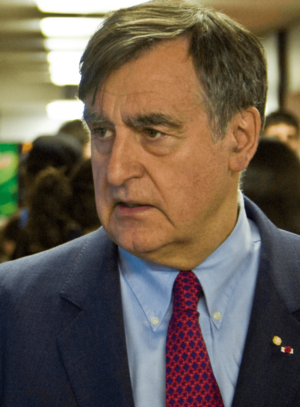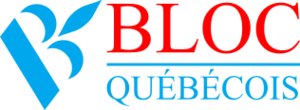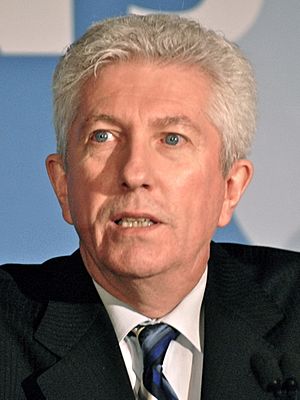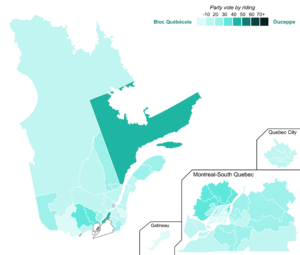Bloc Québécois facts for kids
Quick facts for kids
Bloc Québécois
|
|
|---|---|
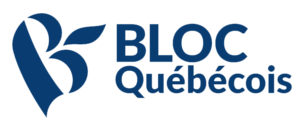 |
|
| Abbreviation | BQ Bloc |
| Leader | Yves-François Blanchet |
| President | Yves Perron |
| House Leader | Christine Normandin |
| Founder | Lucien Bouchard |
| Founded | 15 June 1991 |
| Headquarters | 3750, Boulevard Crémazie Est Suite 502 Montreal, Quebec H2A 1B6 |
| Youth wing | Forum jeunesse du Bloc Québécois |
| Membership (2014) | 23,000 |
| Ideology |
|
| Political position | Centre-left |
| Regional affiliation | Parti Québécois (informal) |
| Colours | Light blue |
| Senate |
0 / 105
|
| House of Commons |
22 / 343
|
The Bloc Québécois (pronounced block kay-bay-KWAH), also known as the BQ or the Bloc, is a Canadian federal political party. This means it takes part in Canada's national elections. The party's main goal is to represent the interests of the province of Quebec. It also supports the idea of Quebec becoming its own independent country.
The Bloc Québécois was started in 1991. Its first members were politicians who left Canada's other major parties. They were unhappy when a plan to change Canada's constitution, called the Meech Lake Accord, failed. The party's founder was Lucien Bouchard, a former government minister.
The Bloc only runs candidates in Quebec. It believes this is the best way to make sure Quebec's voice is heard in the Canadian government. The party is considered centre-left, which means it supports social programs and government help for people.
For many years, from 1993 to 2011, the Bloc was the most popular party in Quebec. It held the third-most seats in Canada's House of Commons. In the 2011 election, the party lost most of its seats. However, it made a big comeback in the 2019 election, winning 32 seats and becoming the third-largest party again. In the 2025 election, its number of seats fell to 22.
The Bloc has a close, but informal, relationship with the Parti Québécois (PQ). The PQ is a provincial party in Quebec that also supports independence. People who support the Bloc are often called bloquistes.
Contents
What the Bloc Québécois Believes In
The Bloc Québécois has clear positions on many issues. Here are some of the main things the party supports:
- Quebec Independence: The party's top goal is for Quebec to become a separate country.
- Protecting French: It works to protect and promote the French language in Quebec.
- Environment: It supports international agreements to fight climate change, like the Kyoto Protocol.
- Social Issues: The party supports LGBTQ+ rights.
- Government Changes: It wants to get rid of the Canadian Senate and the monarchy in Canada.
- Secularism: The Bloc supports a Quebec law that stops public workers from wearing religious symbols at work.
- Culture: It wants Quebec to be exempt from Canada's official Multiculturalism Act.
History of the Party
How the Bloc Started
The Bloc Québécois was created in 1990. It began as a group of politicians from the Progressive Conservative and Liberal parties. They were from Quebec and felt that an important deal to give Quebec more power, the Meech Lake Accord, had been rejected by the rest of Canada.
Lucien Bouchard, who was a minister in the government, led this new group. He and several other Members of Parliament (MPs) decided to form a new party. Their goal was to work for Quebec's interests and independence at the federal level in Ottawa.
The first Bloc candidate to win an election was Gilles Duceppe. He was elected in a special by-election in Montreal in August 1990.
Becoming the Official Opposition
In the 1993 election, the Bloc had amazing success. It won 54 out of 75 seats in Quebec. This made it the party with the second-most seats in the entire country. As a result, the Bloc Québécois became Canada's Official Opposition. This meant its job was to challenge the governing Liberal Party.
As the Official Opposition, the Bloc's MPs decided to speak only French in the House of Commons. This was a powerful statement about protecting Quebec's language and culture.
The 1995 Quebec Referendum
In 1995, the Parti Québécois government in Quebec held a special vote called a referendum. It asked the people of Quebec if they wanted to become an independent country. The Bloc Québécois and its leader, Lucien Bouchard, campaigned strongly for the "Yes" side.
The vote was extremely close. The "No" side won with just 50.6% of the vote. After the referendum, Bouchard left federal politics to become the Premier of Quebec. Michel Gauthier took over as leader of the Bloc, but he was soon replaced by Gilles Duceppe in 1997.
Years Under Gilles Duceppe
Gilles Duceppe led the Bloc for 14 years. During this time, the party remained a strong force in Canadian politics. It consistently won the most seats in Quebec in federal elections.
In the 2004 election, the Bloc tied its record by winning 54 seats. In the 2006 election, the Conservative Party formed a minority government. This meant the Bloc held a lot of power, as the government needed its support to pass laws.
Duceppe and the Bloc continued to fight for what they saw as Quebec's best interests. They often criticized the federal government for spending money in areas that they believed should be managed by the province.
Losing Official Status
The 2011 election was a major turning point. A wave of support for the New Democratic Party (NDP) swept across Quebec. The Bloc lost most of its seats, winning only four. This was not enough to keep its "official party status" in the House of Commons, which requires 12 seats.
Losing this status meant the party had less influence and funding. Gilles Duceppe lost his own seat and resigned as leader. Over the next few years, the party struggled. By 2014, it had only two MPs left in its caucus.
A Difficult Period and Duceppe's Return
In 2014, Mario Beaulieu was elected leader. He wanted the party to focus more strongly on independence. However, his leadership style caused disagreements, and two MPs left the party.
With an election coming in 2015, the party asked Gilles Duceppe to return as leader. In the 2015 election, the Bloc won 10 seats. This was an improvement, but still not enough for official status. Duceppe again failed to win his own seat and resigned.
Rebuilding the Party
After Duceppe left, the party went through more leadership changes. In 2018, seven of the party's ten MPs quit the caucus over disagreements with the new leader, Martine Ouellet. The party seemed to be in danger of disappearing.
Later that year, the MPs who had left agreed to return. The party needed a new leader to unite everyone before the next election.
A Comeback with Yves-François Blanchet
In January 2019, Yves-François Blanchet, a former provincial government minister, became the new leader. He focused on connecting the Bloc's goals with the values of Quebecers, such as protecting the environment and the French language.
His leadership was a huge success. In the 2019 election, the Bloc won 32 seats. This was a massive comeback that made it the third-largest party in Canada once again. The party held onto its 32 seats in the 2021 election. In the 2025 election, the party's seat count dropped to 22, but it remained the third-largest party.
Relationship with the Parti Québécois
The Bloc Québécois and the Parti Québécois (PQ) are like close cousins. They both want Quebec to be an independent country. They often support each other during elections, and many people are members of both parties.
However, they are two separate organizations. The Bloc works in federal politics in Ottawa, while the PQ works in provincial politics in Quebec City. Several leaders, including Lucien Bouchard and Daniel Paillé, have been important figures in both parties.
Party Leaders
| Election | Portrait | Name | Term start | Term end | Riding while leader | Notes |
|---|---|---|---|---|---|---|
| — | 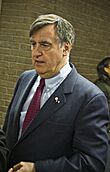 |
Lucien Bouchard (b. 1938) |
25 July 1990 | 16 January 1996 | Lac-Saint-Jean | First leader Leader of the Opposition (1993–1996) |
| Interim | 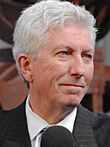 |
Gilles Duceppe | 16 January 1996 | 17 February 1996 | Laurier—Sainte-Marie | Interim leader Leader of the Opposition (1996) |
| 1996 | 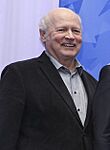 |
Michel Gauthier (1950–2020) |
17 February 1996 | 15 March 1997 | Roberval—Lac-Saint-Jean | Leader of the Opposition (1996–1997) Gauthier resigned in March 1997. |
| 1997 |  |
Gilles Duceppe (b. 1947) |
15 March 1997 | 2 May 2011 | Laurier—Sainte-Marie | Duceppe resigned as party leader after the 2011 election, in which he lost his own seat. |
| Interim | 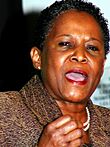 |
Vivian Barbot (b. 1941) |
2 May 2011 | 11 December 2011 | None (had just lost in Papineau) |
Served as interim leader and president of the party. Louis Plamondon was acting leader in the House of Commons. |
| 2011 | 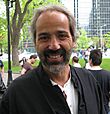 |
Daniel Paillé (b. 1950) |
11 December 2011 | 16 December 2013 | None (had just lost in Hochelaga) |
Stepped down as leader on 16 December 2013 because of health reasons. |
| vacant | vacant | 16 December 2013 | 25 June 2014 | N/A | Jean-François Fortin was the leader in the House of Commons. | |
| 2014 | 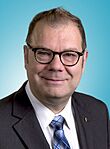 |
Mario Beaulieu (b. 1959) |
25 June 2014 | 10 June 2015 | None | Beaulieu gave up the party leadership on 10 June 2015 but remained party president. |
| Appointed | 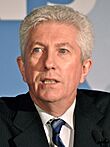 |
Gilles Duceppe | 10 June 2015 | 22 October 2015 | None (had just lost in Laurier—Sainte-Marie) |
Returned as leader for the 2015 election. |
| Interim | 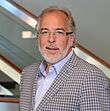 |
Rhéal Fortin | 22 October 2015 | 18 March 2017 | Rivière-du-Nord | |
| 2017 | 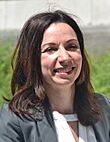 |
Martine Ouellet (b. 1969) |
18 March 2017 | 11 June 2018 | Vachon (National Assembly of Quebec) | She resigned as leader after losing a leadership review vote in June 2018. |
| vacant | 11 June 2018 | 13 June 2018 | ||||
| Interim |  |
Mario Beaulieu | 13 June 2018 | 17 January 2019 | La Pointe-de-l'Île | Named interim leader after Martine Ouellet resigned. |
| 2019 | 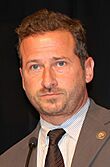 |
Yves-François Blanchet (b. 1965) |
17 January 2019 | present | Beloeil—Chambly | Elected without opposition. |
Election Results
This table shows how the Bloc Québécois has performed in each federal election since it was created.
| Election | Leader | Votes | % | Seats | +/- | Position | Status | |||
|---|---|---|---|---|---|---|---|---|---|---|
| QC | CA | QC | CA | QC | CA | |||||
| 1993 | Lucien Bouchard | 1,846,024 | 49.3 | 13.5 |
54 / 75 (72%)
|
54 / 295 (18%)
|
1st | 2nd | Opposition | |
| 1997 | Gilles Duceppe | 1,385,821 | 37.9 | 10.7 |
44 / 75 (59%)
|
44 / 301 (15%)
|
Third party | |||
| 2000 | 1,377,727 | 39.9 | 10.7 |
38 / 75 (51%)
|
38 / 301 (13%)
|
Third party | ||||
| 2004 | 1,680,109 | 48.9 | 12.4 |
54 / 75 (72%)
|
54 / 308 (18%)
|
Third party | ||||
| 2006 | 1,553,201 | 42.1 | 10.5 |
51 / 75 (68%)
|
51 / 308 (17%)
|
Third party | ||||
| 2008 | 1,379,629 | 38.1 | 10.0 |
49 / 75 (65%)
|
49 / 308 (16%)
|
Third party | ||||
| 2011 | 889,788 | 23.4 | 6.0 |
4 / 75 (5%)
|
4 / 308 (1%)
|
No status | ||||
| 2015 | 818,652 | 19.3 | 4.7 |
10 / 78 (13%)
|
10 / 338 (3%)
|
No status | ||||
| 2019 | Yves-François Blanchet | 1,387,030 | 32.4 | 7.6 |
32 / 78 (41%)
|
32 / 338 (9%)
|
Third party | |||
| 2021 | 1,301,598 | 32.1 | 7.6 |
32 / 78 (41%)
|
32 / 338 (9%)
|
Third party | ||||
| 2025 | 1,236,338 | 27.7 | 6.3 |
22 / 78 (28%)
|
22 / 343 (6%)
|
Third party | ||||
See also
 In Spanish: Bloc québécois para niños
In Spanish: Bloc québécois para niños
- List of political parties in Canada
- Politics of Canada
- Politics of Quebec
- Timeline of Quebec history
 | Precious Adams |
 | Lauren Anderson |
 | Janet Collins |


